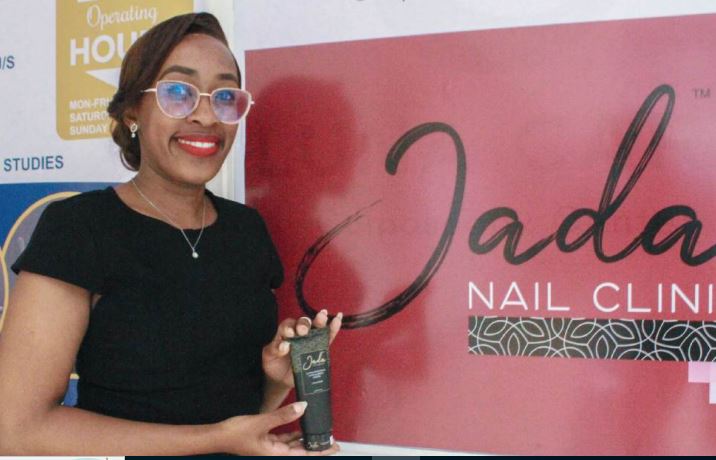 Jada Kenya founder and chief executive officer, Janet Mwangi during an Interview at his Office In Nairobi on September 28 /ENOS TECHE
Jada Kenya founder and chief executive officer, Janet Mwangi during an Interview at his Office In Nairobi on September 28 /ENOS TECHE
 Jada Kenya founder and chief executive officer, Janet Mwangi /ENOS TECHE
Jada Kenya founder and chief executive officer, Janet Mwangi /ENOS TECHE
The hardest amount of money that CEO and founder of Jada Kenya, Janet Mwangi ever raised was Sh3,000, an amount that she currently holds dear as stepping stone to her thriving natural nail care company.
Fresh out of university in 2018 and with a degree in Industrial Chemistry and freshly conned out of her entire savings—she was back at her parents’ home, job hunting with little more than persistence and their Wi-Fi connection.
After several failed short-term gigs, it was during one of those long, uncertain days online that she stumbled upon an idea, press-on nails from China.
She ventured into the business but says that after a while the customers would come complaining of the nails peeling off, opting to pilot her own products that would solve the challenges.
Without the required capital to start she resorted to borrowing to try and develop her own products.
“I remember going to borrow Sh1,500 from one friend and another Sh1,500 from a second friend,” Mwangi recalls, a wry smile on her lips.
“You’re trying to tell them that one day you’ll have a plant that will make nail care products, and here you are asking for Sh1,500. They must have thought, ‘Madam, shut up’.”
After much struggle Mwangi says that tiny investment brought back three samples. On a quiet evening in 2018, in her family kitchen, Ms Mwangi stirred together a makeshift blend of natural oils.
It was a humble, almost desperate beginning—one that grew into Habiko Investments, the parent company of Jada Kenya and the pioneering Jada Nail Clinic, the first of its kind in Africa.
She wasn’t dreaming of building a beauty empire or disrupting an industry. She was simply trying to help her mother, who was struggling with eczema and brittle nails that no product on the market seemed able to heal.
“I realised my mother’s hands were flaring up, she would hide her hands even when in class as a teacher. I thought to myself, so when your nails and your hands are peeling, how will you teach with your hands like this,” says Mwangi.
After the pilot she took a loan of Sh30,000 from her mother to scale up, funds that she says she had to contend with a lot of pressure to repay.
What began as a kitchen experiment and a few borrowed thousands has grown into a business exporting Kenyan-made, science-driven nail products to global platforms like Amazon—while rewriting the story of what beauty entrepreneurship can look like in Africa.
With a genial smile, Mwangi says that her career path was shaped long before she ever mixed that first batch. Trained as an industrial chemist, she had an eye for formulation science and an instinct to solve problems at the root.
Yet, her frustration with mainstream beauty products planted an even deeper question, why did so many imported nail polishes, creams, and treatments fail African consumers?
“I realised quickly that what was in the market wasn’t designed for us. The formulas weren’t suited for our climate, our diet, or even our lifestyles. They were copies of Western products placed on African shelves,” she added.
Instead of importing, she decided to invent. Armed with her training, Mwangi began experimenting with natural, vegan-friendly oils and botanicals, blending formulas in her mother’s kitchen.
Within weeks, her mother’s nails strengthened and her eczema improved. Neighbours began asking for the same remedy. Soon, Mwangi was making small batches for friends, then clients.
Her workspace shifted from the kitchen to the garage, where makeshift shelves, a blender, and jars of ingredients became Jada’s first “factory.”
Her early years as a founder were far from glamorous. She recalls struggling to balance her professional training with the chaos of entrepreneurship.
At one point, she worked late into the night while her siblings and parents helped label bottles, seal containers, and package deliveries.
But her vision was clear to create Africa’s first nail-focused, treatment-driven beauty brand.
Unlike standard salons that focused on aesthetic polish, Jada would focus on nail health — solving problems like fungal infections, brittle nails, and ingrown toenails with science-backed treatments.
The idea seemed unusual at the time. Nail care was considered cosmetic, not medical or scientific. Yet, the founder saw the gap: no one was treating nails as a health priority in Kenya, let alone across Africa.
After securing Kenya Bureau of Standards (KEBS) certification for its products, a milestone she says was achieved from the garage lab.
That official stamp gave Jada legitimacy in a market crowded with counterfeits and imports.
However, Jada’s growth wasn’t smooth. Like many SMEs, it weathered funding gaps, skepticism from investors, and logistical nightmares.
The toughest challenge came in 2020, when the COVID-19 pandemic shut down physical clinics.
“Overnight, our customer pipeline collapsed,” Mwangi recalls. “But we couldn’t afford to close shop. My family became my first team — helping with packaging, online deliveries, even customer service from home.”
Instead of folding, Mwangi pivoted to online retail, packaging home-care nail kits and teaching clients how to treat their nails via social media tutorials. It was a lifeline move.
In 2021, an ‘angel’ investor backed Jada, enabling it to scale production beyond the garage.
By 2023, the brand gained FDA approval, opening doors to export markets. Today, Jada products are sold on Amazon, and the brand has expanded to South Sudan, Uganda, Tanzania, Nigeria and Ghana.
“It took seven years to become an overnight success,” Mwangi laughs. “People see us now and think it was quick. But behind it is a timeline of small wins, late nights, and so many setbacks.”
Away from the notion that women are the majority pursuing nail care Mwangi says perhaps Jada’s most unexpected success story is its male clientele.
At first, Mwangi assumed men would form a negligible portion of her clinic visitors. But she was wrong.
“Men started coming in with serious issues — ingrown toenails, athlete’s foot, brittle nails from manual work. Many had never seen a professional for it,” she says. “Soon, word spread, and men became some of our most loyal clients.”
Today, men account for nearly 40 per cent of visits to Jada Nail Clinic. For Mwangi, it’s proof that wellness is no longer gendered. The clinic’s male-friendly services are helping redefine grooming culture in Kenya, moving it away from vanity and toward health and self-care.
In a market long dominated by imported brands, she says Jada’s success proves that Kenyan-made products can meet global standards.
















